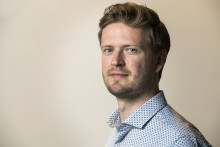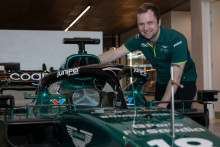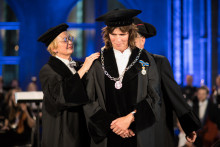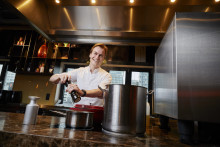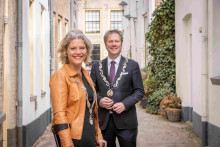Arvid Keemink does a lot of teaching and his research focuses on the interaction between humans and robots. He is primarily interested in robotic exoskeletons, with the aim of developing smarter solutions to help patients walk without needing crutches. ‘The Honours Programme did not contribute directly to my career as a researcher,’ Keemink notes, ‘but it did help me discover my interest in academia and science.’
In 2007, when Keemink was a second-year Advanced Technology student, he received the email: the UT is launching an Honours Programme and your grades are good enough to get you in. ‘I went to an information session with Miko Elwenspoek, the spiritual father of the programme,’ Keemink remembers. ‘I thought it would be interesting, and I signed up. As I look back at my time as a student, I think this is the programme that taught me most. You meet some incredibly clever students, who challenge you and help you learn more.’
Working with students from completely different disciplines broadened his horizons. ‘We read original work by Newton and talked about Freud and Machiavelli. We discussed the “big issues” and approaching them from many different angles and perspectives proved very interesting and instructive. During the two-year programme, I developed certain academic skills that still help me today.’
‘It gave me a better understanding of how proposals work’
Writing a research proposal was a particularly useful exercise. ‘It certainly made the Master’s project for Mechatronics (now Systems and Control) a lot easier, Keemink assures us. ‘But it’s still a valuable experience today, as it helps me in writing funding applications. It gave me a better understanding of how proposals work and how to put your research into words.’
It wasn’t particularly intense. ‘It takes up some of your time, of course, but I still managed to keep playing in my band at the same time. I was fortunate enough not to have to work a job while I was a student, so that left me with some time to spare.’
Along with several fellow students, Keemink founded the Ockham Honours Association after graduation. We wanted to keep in touch with future batches and build up a network,’ Keemink tells us. ‘Gradually, a certain group spirit emerged, which is still there today. I now teach a minor in Biorobotics, and I love meeting students enrolled in the Honours Programme today. The best part is that I met my girlfriend at Ockham, she started the programme a few years later than me.’
Please read more about the UT Honours Programme in our latest special.


